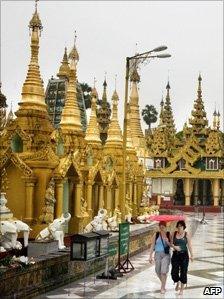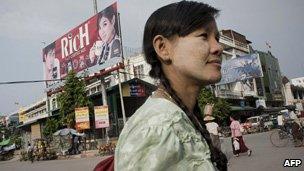Turning a profit in Burma
- Published

Burma has many tourist attractions, but few Western tourists
European companies operating in Burma face all sorts of pitfalls - pressure from their governments, campaigns by activists, boycotts by customers. So why do so many continue to work there?
Companies exist to make money, and there are plenty of opportunities to turn a profit in Burma.
But the US and several other nations have squeezed most of their firms out of Burma by maintaining tough sanctions.
Europe has imposed arms embargoes, asset freezes, import bans and penalties for companies knowingly supporting military activity or repression.
But there is no blanket ban on firms investing in the country - so travel agents, insurance firms, haulage companies, energy firms and telecom conglomerates can continue to work there.
In fact, doing business with the junta is "not so different from most other places", according to one Western executive who has worked with the generals.
"They speak English, so there were no language problems. But they refused to use e-mail, so all contact was by fax, or face-to-face - which could make things a little bit tricky," said the executive, who spoke on condition of anonymity.
"I think now they are more comfortable with using telephones."
Coy companies
Other Western workers say dealing with the junta became more difficult when they moved their capital city from Rangoon to Nay Pyi Taw, a new town carved out of the countryside in 2006.
"It's an administrative town, built on paddy fields, and the ministries are quite spread out," said a European with experience of working in the capital.

Despite living in a country with vast natural resources, most Burmese are chronically poor
"Only now are there signs of any commercial activity - hotels and shops are opening, and civil servants are just starting to bring their families to the town from Rangoon."
Western businessmen paint a picture of relative normality in Burma, yet few companies will speak openly about their dealings with the junta.
Insurance firms such as Catlin , externaland Atrium Underwriting, external, which were accused in a 2008 report by Burma Campaign UK, external of funding repression, refused to make any comment.
German insurance firm Hannover Re, external confirmed it continued to work in Burma, spokeswoman Gabriele Handrick arguing that insurance would help the whole country in times of need.
But she added: "We acknowledge that it is questionable whether, in a dictatorial regime, these funds filter through to those who are most in need."
French telecom giant Alcatel-Lucent helped to build a communications network in Burma with Chinese government money, and in a statement on its website, external rebuffs reports that it provided surveillance equipment to the junta.
A spokesman confirmed Alcatel continued to work in Burma, but gave no further details.
Local benefits?
Dozens of travel agencies across Europe offer holidays in Burma, but few will speak of their work in the country.
Nick Laing, from UK-based Steppes Travel, external, is one of the few willing to defend his position, saying he decided to offer "tailor-made travel" to Burma after visiting the country himself.
"Without exception, everyone I spoke to during my visits urged us to keep sending tourists, as the money foreigners spent in markets or on tips helps the local economy," he says.
Activists say tourism helps to legitimise military rule, provides funds to the generals and ignores widespread reports that forced labour was used to build some facilities.
But Mr Laing, who sends only about 40 tourists a year to Burma, says he uses only independent Burmese agencies and organises tailored trips for individuals rather than sending people on group tours to official sites.
"Their presence really benefits the local economy," he says.
Charm offensive
The debate about investment in Burma has remained largely unchanged for two decades.
The firms that invest say their capital helps to improve the lives of ordinary Burmese, ties the military into international systems of oversight, and consequently promotes openness and a respect for human rights.
Opponents say the army is entrenched in every aspect of society, and investors' money goes straight to the generals, who use it to buy weapons and widen their repression.
Nowhere is this debate more pronounced than in the energy sector. French energy giant Total, external is the biggest Western firm with operations in Burma. It runs the Yadana offshore gas field with the help of US firm Chevron, external.

Energy firm Total has been involved in Burma since 1992, and operates vast pipelines
The Yadana field is not a huge money spinner for either firm when compared with their operations in other countries, and both have faced lawsuits accusing them of condoning rights abuses.
US oil giant Unocal - which is now a Chevron company - settled one case out of court, external in 2005 over violations alleged to have taken place during the construction of the Yadana pipeline.
A suit brought against Total by Burmese exiles in Belgium was eventually dismissed.
The French firm vigorously denies any wrongdoing and has waged a charm offensive with a website largely devoted to its charitable work there, external.
Chevron spokesman Morgan Crinklaw says its Burma interests are underpinned by "compelling business reasons, fundamental of which is to better meet South East Asian demand for energy supplies".
But such reasoning is unlikely to win over critics such as lobby group Earth Rights International, which claimed in a 2009 report, external that the Yadana field had yielded $4.8bn for the generals since 2000.
It is likely that the two firms persevered when others pulled out in the hope that Burma would get a government the West could deal with, and sanctions would be eased.
But in the past year, Indian and Chinese energy companies have been pouring money into Burma - billions of dollars, if Burmese government figures are to be believed.
So Western firms hoping to turn a profit in Burma may already have missed the boat.